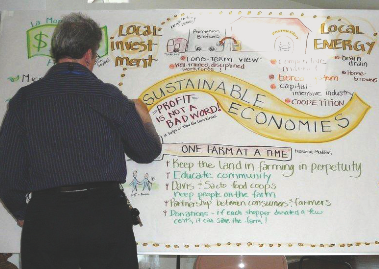Sharing Passions and Expertise with Startups

On a Monday in May, I addressed a room crowded with attentive listeners who had come to hear how to add an income-generating activity to their food co-op organizing efforts. They were 127 people in total, representing 27 new startups in the Northeast. They had traveled to Greenfield, Mass., from as far afield as New York City, driven by the promise of learning firsthand something of the road ahead of them and the opportunity to connect with their peers on this shared adventure.
The Greenfield conference is the fourth such event that Stuart Reid and I, representing Food Co-op Initiative, have attended this busy spring—following ones in Bloomington, Berkeley, and Philadelphia. At these events, attended by representatives of 15–30 recent and potential startups in the region, we give training workshops on topics such as crunching the numbers for a business plan, raising capital, and grassroots organizing. We are frequently joined by our friends from CDS Consulting, who share their expertise on finances, organizational development, and keeping the doors open.
It’s challenging to convey the incredible energy and exhilaration that comes to an organizer from attending a conference like this. (Since my own matriculation into the larger world of food co-ops was at a similar conference not so long ago, I remember it well.) It’s the excitement of climbing a steep rock face with the confidence and benefit of a guide who has ascended the route ahead of you. It’s the realization of shared passions: to work together with others for a shared goal; to be part of community and to contribute something of value back; to show courage and taste adventure by leading others through the unknown.
Just as important as knowledge to these startups is the networking and the opportunity to develop lasting relationships with both experienced mentors and peers who are perhaps a little ahead or a little behind them on the same road. My hunch is that a key determinant of success for these groups will prove to be how strongly connected they become to the larger food co-op community.
One session in Greenfield was a panel on lessons learned by new co-ops after opening the doors. Ed King of Littleton Co-op in New Hampshire arrived with a two-page list. Alane Hohenberg of the Troy, N.Y., co-op spoke of the challenges faced when the store opened to sales drastically below their projections. Driving the growth of interest in organizing new food co-ops is the explosion in demand for healthy, local food, which has in turn attracted strong challengers to the market. Co-ops organizing in this “Third Wave” are doing so under greater competitive pressure, compared to earlier days.
There is no industry like ours that shares as much information and expertise, with experienced members making themselves available to newcomers. Mature co-ops are often the “Big Brother, Big Sister” of younger startups, inviting new managers to come train in established stores, sending department heads out to train incoming staff, and passing on encouragement and advice with each touch. Principle Six—“Cooperation among cooperatives”—is our guiding philosophy as well as our competitive edge.
Can new co-ops be started successfully at the grassroots level? Of course they can—and 18 new members of our food cooperative community are slated to open their doors this year. But equally true of people and co-ops, while the young will get older at the same rate, some will mature faster than others, and some will grow up to achieve greater success. The difference is often a patient elder who takes an interest.







